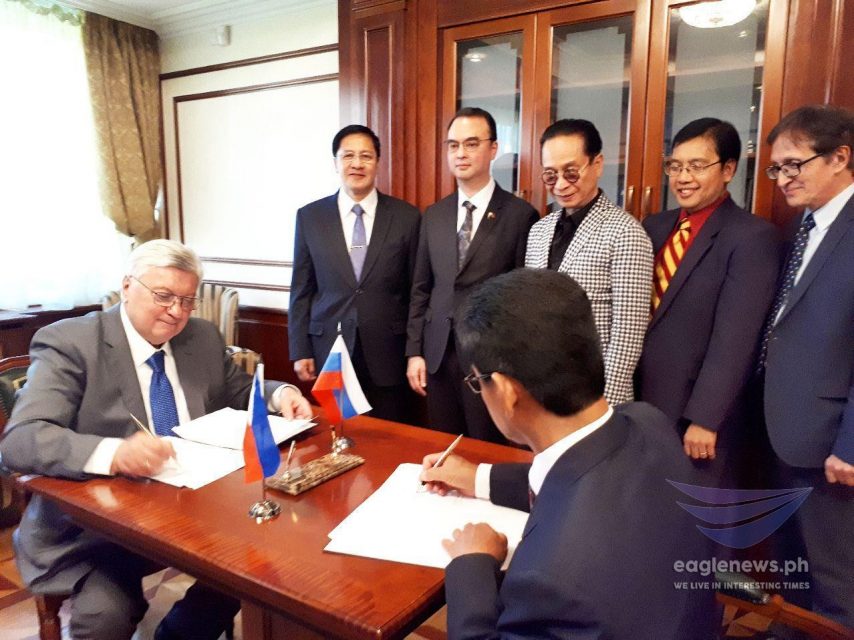
(Eagle News) — New Era University (NEU) signed a historic Memorandum of Understanding for academic collaboration with the Moscow State Institute for International Relations (MGIMO) that hopes to “enrich the intellectual environment of both institutions.”
Foreign Affairs Secretary Alan Peter Cayetano and Chief Presidential Legal Counsel Salvador Panelo witnessed the signing of the MOU on Monday, May 14, 2018, at the MGIMO campus in Moscow, Russia. The event was organized by the Philippine Embassy in Moscow led by Ambassador Carlos Sorreta.
The MOU with New Era University is the first agreement with a private educational institution from the Philippines for MGIMO.
Dr. Julian Meimban III, Vice-President for Academic Affairs and Research of NEU, extended his “appreciation and gratefulness to the leadership and constituents of MGIMO University, headed by Dr. Anatoly Torkunov, for their warm welcome” to the NEU delegation.
“The New Era University takes pride to have engaged in joint endeavors such as this, with one of the most reputable universities in the world. Today’s signing of MOU with a Russian university is one of the first – if not the first – by a university from the Philippines,” NEU’s Dr. Meimban said.
The Moscow State Institute for International Relations (MGIMO) is an academic institution run by the Ministry of Foreign Affairs of Russia, which is widely considered the most elite university in Russia.
It offers numerous educational programs in 18 key fields of study, including: international relations, international economic relations, regional studies, international law, political science, public and business administration, journalism, public relations, commerce and transnational business.
It is the only educational establishment teaching 53 foreign languages full-time, and serves as the training arm for future Russian diplomats.
The University structure comprises two campuses, eight main faculties and three institutes. Each year about 8,000 students from Russia and abroad study at MGIMO University.
The New Era University, on the other hand, is an emerging hub in generating knowledge on ASEAN studies and international relations, with an existing memorandum of agreement (MOA) with Eagle Broadcasting Corporation which has international bureaus.
Through its ASEAN Studies Center, and BA Foreign Service, with leading lecturers from different countries, and with its partnership with EBC, NEU is able to promote knowledge and provide scholarly discourses on different topics of international concerns.
Aside from engineering and education, the NEU has offered courses in medicine and allied courses. The university is also offering courses related to music, languages, and humanities, which promote cultures of different nations of the world.
NEU has four campuses – the main campus in Quezon City; in San Fernando City, Pampanga; in Lipa City, Batangas; and in Gen. Santos City, in Mindanao, in the southern part of the country. The main campus has 18 colleges.
In June 2017, its site for the College of Agriculture in the province of Rizal was inaugurated, which would eventually be the fifth campus. Its Gen. Santos City branch will be its site of the School of Fisheries.
– Academic collaboration –
The Memorandum of Understanding seeks to promote collaboration between NEU and MGIMO to enrich the intellectual environment of both institutions and to provide opportunities for contact and exchange among individuals from both institutions.
Among others, the two schools agreed to establish a Russian Language Center at the NEU. They also agreed to mount seminars, conferences and workshops, as well engage in a faculty exchange program. In the horizon also is the identification of scholarship opportunities in Russia for students of NEU.
“It is interesting to note that when the NEU opened its ASEAN Studies Center in 2016, among its first visitors were the Russian delegates who came to NEU in November 2016 to promote cultural awareness between Russia and the Philippines, among other things. Barely two years has passed, we have now this venture which will actually foster the realization of the pursuits of the two countries,” Meimban said.
“We do hope that the activities that this MOU and future joint ventures would bring, serve the interests of Russia and the Philippines, as well as other countries,” he said.
The MOU was signed by NEU’s Vice-President for Academic Affairs and Research, Dr. Meimban and Dr. Anatoly Vasilyevich Torkunov, Rector of MGIMO. Completing the delegation from the NEU were Dr. Carlos Tabunda Jr, director of the NEU’S ASEAN Studies Center, and Mr. Cornelio Guerrero, adviser and producer from EBC. Witnessing for MGIMO were Professor Artem Malgin, Vice Rector of MGIMO, and Dr. Sumsky.
The collaboration between the two institutions begun in 2016 with the participation of the NEU-ASEAN Studies Center, at the ASEAN-Russia University Forum held in in Vladivostok.
Russian representatives were also invited to Eagle Broadcasting Corporation’s “ASEAN in Focus.”
In November 2016, Dr. Elena Koldunova, Vice Dean of MGIMO’s political science department, delivered a talk in a symposium held at the NEU which was attended by various Philippine experts on regional and national security.
This was repeated in 2017 where a symposium on the future of strategic relations between Russia and the Philippines was held.
In March of the following year, NEU helped in the hosting a delegation of Russian businessmen who went around major centers in the Philippines to promote business ties between the two countries. The delegation was organized by Dr. Victor Sumsky, the Director of MGIMO’s ASEAN Center. (Eagle News Service)







